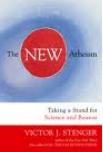 Amidst the controversy, though, the question remains-what exactly is New Atheism?
Amidst the controversy, though, the question remains-what exactly is New Atheism?
In his new book, The New Atheism: Taking a Stand for Science and Reason, physicist Victor Stenger, author of the New York Times bestseller God: The Failed Hypothesis, aims to further develop an understanding of the New Atheist movement-saying that New Atheists should ask scientists and other nonbelievers to take a stand against those who base their beliefs on unjustified faith rather than on evidence and reason.
“Atheists would have no problem with religion if it stayed in the home, church, and mosque,” said Stenger. “But in recent years we have seen how extremist elements have tried to force their irrational beliefs on the rest of us. Islamic terrorists and Christian fundamentalists who separately think only they possess ultimate truth are exerting influence over public policy that far exceeds what is justified by their numbers.”
He asserts that New Atheists are committed to helping accelerate the trend away from religion that is already occurring in some parts of the world. In The New Atheism, Stenger discusses four key principles of New Atheism:
1. Naturalism– the view that all of reality is reducible to matter and nothing else-is sufficient to
explain everything we observe in the universe.
2. Absence of evidence for God is, indeed, evidence of absence when the evidence should be there
and is not.
3. The Bible fails as a basis for morality and is unable to account for the problem of unnecessary suffering throughout the world.
4. The “way of nature” of nontheist beliefs of Buddha, Tao, and Confucius is far superior to the traditional supernatural monotheisms, which history shows can lead evil.
Some nonbelievers agree with theists in finding the tone and positions of the New Atheists too uncompromising. Stenger insists that this more resolute approach is necessary as long as religious extremism is allowed to flourish. The New Atheists assert that religious belief should not be handled with kid gloves-that even moderate faith should not be considered benign. While some believers and even traditional atheists may consider this to be its own form of ‘nonreligious extremism’, Stenger says it’s essential in order to move humanity away from superstition and toward rationality-the ultimate aim of the New Atheist movement, which Stenger considers more positive than negative.
“What is truly ‘new’ about atheism is that the world, after too many centuries of giving religion a free rein, is now prepared to see and embrace the positive wisdom of doubt,” says Dan Barker, co-president of the Freedom From Religion Foundation and author of Godless: How An Evangelical Preacher Became One of America’s Leading Atheists. “Victor Stenger, with his affirming, incisive and illuminating observations, shows us that there is truly grandeur in taking a stand for something precious: science and reason.”
Adds Stenger, “We must stop giving religion a free ride and subject its claims to the same critical analysis we apply to every other element that plays such an important role in society. Our survival depends on it.”
NOTE TO MEDIA: Victor J. Stenger (Lafayette, CO) is available to discuss the principles of ‘New Atheism.’ Stenger is adjunct professor of philosophy at the University of Colorado and emeritus professor of physics and astronomy at the University of Hawaii. He is the author of the New York Times bestseller God: The Failed Hypothesis, and many other books, including Quantum Gods, The Comprehensible Cosmos, Timeless Reality and Has Science Found God?. To interview Stenger or request a review copy of The New Atheism: Taking a Stand for Science and Reason (ISBN: 978-1-59102-751-5) contact Prometheus Books at 800-853-7545 or [email protected].
Disclaimer: Articles featured on Oregon Report are the creation, responsibility and opinion of the authoring individual or organization which is featured at the top of every article.


